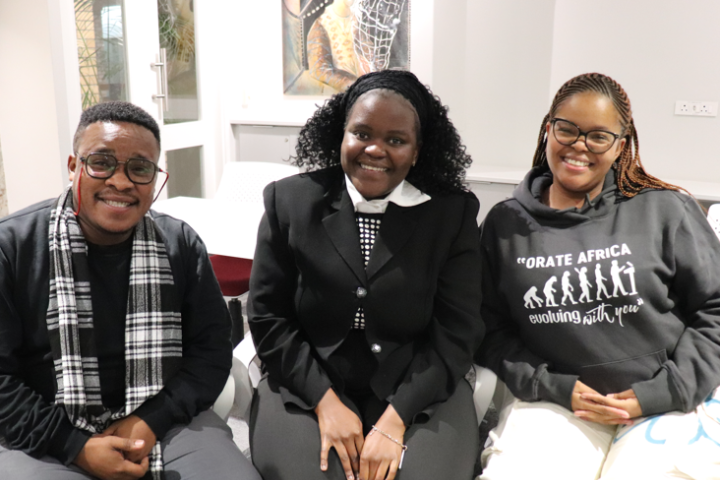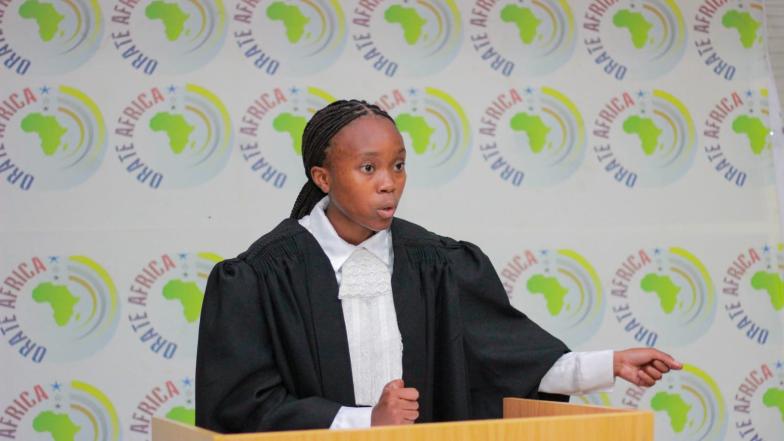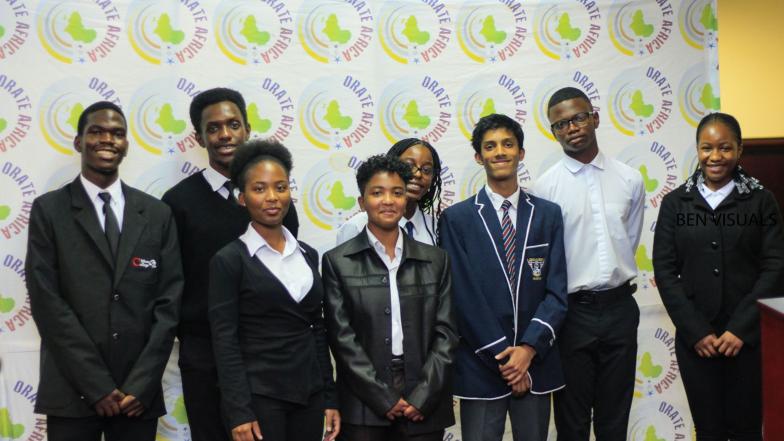Orate Africa: pan-African moot competition alumni encouraging school learners

Two Christof Heyns African Human Rights Moot Competition alumni, Mokgabo Thobega (Competition 2014) and Kamohelo Khoboko (Competition 2019), are visiting this week's 34th Competition at UCT Law. It turns out that the impact of this prestigious annual pan-African competition goes much further than its positive impact on the participants and on the skills of argument at law schools across the continent.
Following Founder Mokgabo Thobega's (cover pic, right) participation at the then-named All Africa (now Christof Heyns) Human Rights Moot Court Competition in 2014, Orate Africa introduced the Moot Court Segment of Access to Law, training and knowledge testing through competition. The annual Botswana schools moot court competitions are held at the Gaborone High Court. Kamohelo Khoboko (cover pic, left), an advocate in Lesotho, stewards Orate Africa Trust Lesotho. Most exciting for these two Orate Africa leaders is that this year's Christof Heyns competition has as one of its participants Ms Tafara Mwayera (University of Zimbabwe, and cover pic centre) who participated in the 2023 Orate Africa Championships held in Maseru, Lesotho. In other words, Orate Africa is directly encouraging a school-to-university mooting pipeline.
The two Christof Heyns Afrifan Human Rights Moot Court Competition alumni share their story about establishing Orate Africa.
Orate Africa (a trust) began as an informal association in 2012 with a bold dream to run moot-style competitions and events for high school learners. Initially known as the Books Botswana Speaking Championships Organizing Committee, the initiative was driven by a passionate group of university students who believed in the power of the spoken word and oration to transform young lives. When asked what inspired the initial establishment of the speaking championships, Mokgabo explained "We have always had a passion for oration all the way back from secondary school days!"
Orate Africa - now fully formalised as a Southern African non-profit to ensure susainability and measurable impact - conducts workshops, trainings and competitions for all secondary school students irrespective of their social class or background. Given what Mokgabo and Kamohelo describe as the "submerging effect of the education system in many African countries on learners", Orate Africa seeks to develop in these young students a voice to engage in state dialogue, creativity in the arts, and to encourage open minds and the passion to strive for self-actualisation.
Kamohelo shared the story of Orate Africa's name: "The name stems from the word oration with a focus on Africa. We believe in nurturing oratory skills through competition and training as it gives students the opportunity to interact, sharpen their skills and at the same time broaden their scope and ability to reason." Mokgabo added further explanation, saying "We also believe that oration programmes and projects actively empower individual beneficiaries and, through this process, help them deal with problems of status quo more accurately and diplomatically."

From its humble beginnings, Orate Africa's earlier form saw its first international participant in 2013 - a school from South Africa - signalling both growth and regional appeal. By 2014, the event had blossomed into a continental gathering, attracting over 250 participants from more than 25 schools across 5 African countries. This has become a key benefit of the Orate Africa programme, with participants having the opportunity to learn from other students from across the continent. To date, Orate Africa has been attended to by schools from Kenya, Tanzania, Namibia, Lesotho, eSwatini, Malawi, Zimbabwe, Botswana, South Africa and Liberia.
Says Mokgabo, "The modus operandi for Orate Africa stems from and is greatly inspired by that of the Chrisof Heyns African Human Rights Moot Court Competitions. In particular, Orate Africa has been inspired by the style of this pan-African moot competition being hosted across various African countries. The Orate Africa Moot Court programme gives students the opportunity to cross pollinate, participate, and learn from other students from across Africa."

At a high school level, these moot court competitions are focused on the social and intellectual stimulation of children such that they are able to critically analyse issues and provide solutions to problems - over and above being able to defend their stance with sound, considered reason. Orate Africa's initiatives and competitions are a co-curricular activity that stimulates and develops critical thinking. Kamo and Mokgabo are hopeful that Orate Africa will encourage enhancement of the education systems in participant countries, explaining that moot court competitions promote SDG 4 (Quality Education), since it supplements the education systems of most developing countries.